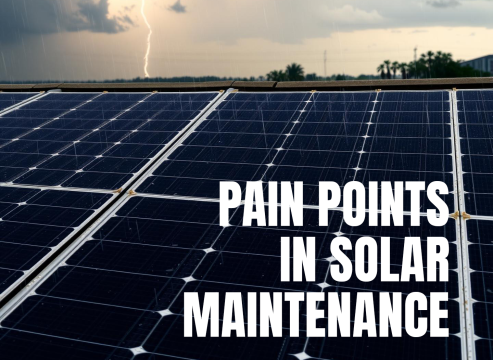
Pain Points in Solar Maintenance
Investing in solar energy is a significant step towards sustainability and reducing energy costs. However, like any technology, solar panels require regular maintenance to ensure optimal performance and longevity. Understanding common pain points in solar maintenance can help owners take proactive measures to avoid issues and maximize their investment.
Dust and Debris Accumulation
One of the most prevalent issues affecting solar panels is the accumulation of dust, leaves, pollen, and other debris. This buildup can obstruct sunlight, significantly reducing the energy output of the panels. Regular cleaning is essential to maintain efficiency.
Solution: To prevent this problem, schedule routine cleanings. Use a soft brush or a non-abrasive cloth with mild soap and water to gently remove debris. Avoid harsh chemicals that could damage the panel surface. In areas with high dust levels or heavy rainfall, more frequent cleaning may be necessary.
Bird Droppings and Pest Infestation
Bird droppings not only create an unsightly mess but can also diminish solar panel efficiency. Additionally, pests such as squirrels may cause physical damage by chewing on wires or nesting in panel areas.
Solution: Install deterrents like bird spikes or mesh around your solar panels to prevent birds from landing or nesting. Regular inspections for signs of pest activity are crucial. If you notice any damage, address it promptly to avoid further complications.
Inverter Faults
The inverter is a critical component of a solar energy system, converting direct current (DC) generated by the panels into usable alternating current (AC). Inverter malfunctions can lead to reduced energy production or complete system failure.
Solution: Monitor your inverter’s performance regularly and watch for warning messages. If issues arise, contact a professional technician for diagnosis and repair. Choosing high-quality inverters from reputable manufacturers can also minimize the risk of faults.
Wiring Issues
Faulty wiring or loose connections can lead to significant electrical problems, resulting in reduced performance or system failures. This issue is often overlooked but can be detrimental if not addressed.
Solution: Conduct regular inspections of wiring and connections to identify any signs of wear or damage. Hiring qualified professionals for installation ensures proper wiring management from the start. Promptly repair any identified issues to maintain system integrity.
Aging and Wear
Over time, solar panels may develop microcracks or experience delamination, which can compromise their efficiency and structural integrity. Aging components may also lead to decreased energy production.
Solution: Regularly monitor your panels for signs of aging, such as yellowing or visible cracks. Implementing routine performance checks can help detect degradation early on. If significant damage is found, consult with a technician about repair or replacement options.
Environmental Factors
Solar panels are exposed to various environmental conditions that can affect their performance. Severe weather events like hail, heavy snow, or extreme heat can cause physical damage or reduce efficiency.
Solution: Ensure your installation is designed to withstand local weather conditions by using durable materials and proper mounting techniques. After severe weather events, inspect your system for any visible damage and address issues immediately.
Monitoring Performance
Many solar panel owners may not regularly monitor their system's performance, leading to undetected issues that can escalate over time. A sudden drop in energy production could indicate underlying problems that need attention.
Solution: Utilize monitoring systems that provide real-time data on energy production and efficiency. Regularly reviewing this data alongside your electricity bills can help identify discrepancies that warrant further investigation.
Conclusion
While solar energy systems offer numerous benefits, they are not maintenance-free. Understanding common pain points in solar maintenance allows owners to take proactive steps to ensure their systems operate efficiently and effectively over time. By addressing issues such as dust accumulation, pest infestations, inverter faults, wiring problems, aging components, environmental impacts, and performance monitoring, you can maximize your investment in solar energy and contribute to a sustainable future. Regular maintenance not only enhances efficiency but also prolongs the lifespan of your solar panels, ensuring you enjoy the benefits of renewable energy for years to come.

